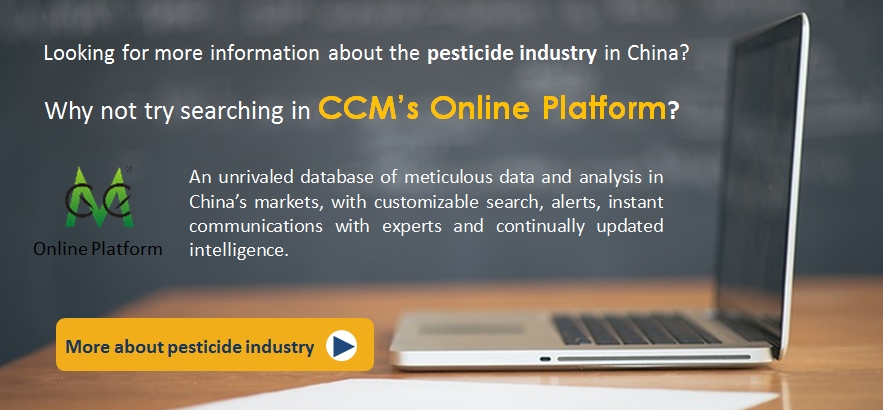On 8 Dec., 2015, the Pesticide Registration Training Course was held in Nanjing
City, Jiangsu Province. Wu Zhifeng, Vice Director of ICAMA, mentioned
that in the upcoming implemented regulations, administration mechanisms will be
modified and that the regulations specifically introduced 8 major changes.
In general, supervision and penalties will be more stringent.
On 8 Dec., 2015, the
Pesticide Registration Training Course was held in Nanjing City, Jiangsu Province. During this
training course, Wu Zhifeng, Vice Director of the Institute for the Control of
Agrochemicals, Ministry of Agriculture (ICAMA), revealed that the forthcoming
new regulations will be different. He stated that the ongoing development of
the pesticide industry requires the establishment and replacement of laws and
regulations. The current Regulations on Pesticide Administration cannot meet the
needs of the pesticides industry. The new regulations will have the following 8
major changes:
1. Reforming administration mechanisms
Production licenses and registrations will be entirely managed by the MOA.
Previously, it was managed by three bodies: the MOA, the Ministry of Industry
and Information Technology of the People's Republic of China (MIIT) and the
General Administration of Quality Supervision, Inspection and Quarantine of the
People's Republic of China.
2. License permission for experimental
units
Experimental units will be governed as administrative licensing rather than
by the MOA.
3. Registration reform will be implemented from the following aspects:
The experimental range will be narrowed down to new pesticides for
registrations. Others will be filed.
The temporary registration system will be canceled.
Changes about the ingredients of pesticides (except active ingredients) and the
origins of imported pesticides must be registered.
Information such as product quality standard, the residue limits and testing
methods will need to be disclosed.
Registration documents will be transferable. At present, registration
documents may only be authorized, but cannot be transferred.
4. Production conduct management
For one thing, the transferred work should be prepared, as
registration and production licensing will be governed by MOA.
For another, consigned processing and repacking are allowed. The new
regulations are likely to allow consignees who have the production licenses for
the same formulations to manufacture and pack.
Also, traceability management will be introduced and all pesticides will
be mandatory traced.

5. To strengthen operation management
and set up operation permit
6. Highlight using instruction:
To support professional application, such as aerial application
To establish training systems
To clearly conduct pesticide usage investigations.
To take actions to reduce pesticide usage
To clearly carry out pesticide residue management.
To formulate regulations for pesticide accident reporting and
identification
7. Establish a supervision system from
the following respects:
To set up a Credit File System for pesticide production and
operations
To establish reporting and recalling mechanisms for pesticides with
large risks
To set up a monitoring and re-evaluation system
To implement a claims system
To crack down on counterfeit and inferior pesticides. Pesticides
that are not registered or have passed their expiration date are regarded as
inferior pesticides.
For counterfeit and inferior pesticides, the producer and operator
will pay for the disposal costs. If the two parties are unsure, the cost will
be assumed by local government
8. Increase penalties
The general rule is that the penalty will depend on the value of the
breaching pesticide products.
Severe violations will cause production licenses to be revoked.
Technology units that issue false reports will have their qualifications
revoked and will be unable to reapply for the revoked qualifications within
five years.
Manufacturers that produce without pesticide production licenses or operate without
pesticide operation licenses will be prohibited from manufacturing or selling
pesticides.
The direct supervisors of parties that violate the regulations are banned from
producing pesticides or doing business relating to pesticides for 10 years. This
also applies to some MOA staff.
Pesticide manufacturers or operators that recruit people who are banned from
the pesticide industry will be asked to cease operations. Their
registrations will be revoked and they will be unable to apply for the revoked
qualification for five years.

About CCM:
CCM is the leading
market intelligence provider for China’s agriculture, chemicals, food
& ingredients and life science markets. Founded in 2001, CCM offers a
range of data and content solutions, from price and trade data to
industry newsletters and customized market research reports. Our clients
include Monsanto, DuPont, Shell, Bayer, and Syngenta.
For more information about CCM, please visit www.cnchemicals.com or get in touch with us directly by emailing econtact@cnchemicals.com or calling +86-20-37616606.
Tag: pesticide